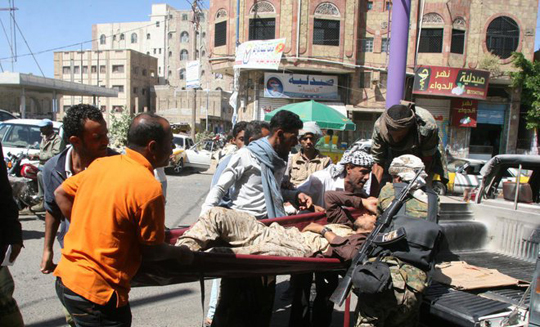Jeddah, Nov 23: Yemen’s Houthi rebels and supporters of deposed President Ali Abdullah Saleh were responsible for the killings of 9,646 civilians — 8,146 men, 597 women and 903 children — from Jan. 1, 2015 to Sept. 30, 2016 in 16 Yemeni provinces.

This has been revealed by the Yemeni alliance that monitors human rights violations in Yemen (Yemeni Observer) in a new report.
The alliance reported that a total of 9,646 civilians were killed — 8,146 men, 597 women and 903 children — in 17 Yemeni provinces. It said 24,320 civilians sustained injuries — 18,521 men, 3,092 women and 2,707 children.
The total of number of people detained was 12,780, mostly young activists, politicians and media persons, in addition to a number of laborers and children.
The number of violations against public property was 3,811 — committed against educational and health facilities and services, in addition to archaeological sites and places of worship.
Attacks on private properties — headquarters, apartment complexes, factories, farms, shops, and transportation means — numbered 25,934.
The alliance reported the killings of 298 civilians, including 22 children and 53 women, during the third quarter of this year, with the death toll of civilians in the first and second quarters of this year reaching 1,146 civilians, including 373 children and 68 women.
The number of injured civilians in the third quarter of this year was 394, among them 42 children and 98 women, while the number of civilian casualties during the first and second quarters was 4,044, including 369 civilians and 1,067 women.
The Yemeni alliance reported the arrest of 942 people by the Houthis during the third quarter of this year, against 3,380 people arrested during the first and second quarters of the year.
The number of attacks on properties in the third quarter of this year amounted to 82, while 346 attacks targeted private properties.
A total of 949 attacks were carried out against public properties and 2,673 targeted private properties during the first and second quarters of this year.
The death toll of civilians in 2015 was 8,202, including 508 children and 476 women.
The number of wounded stood at 19,882, including 2296 children and 1927 women, while 8,458 arrests were made.
The repeated violations affirm the Houthi-Saleh disregard for international and humanitarian laws.
Shami Al-Daheri, a military analyst and strategic expert, said the Houthis are led by Iran, and follow its orders.
“They are moving in Yemen, Iraq and Syria following Tehran’s orders. If the country sees there is pressure on its supporters in Iraq, it issues orders to the Houthis in Yemen to carry out more criminal acts, in order to divert attention and ease the pressure on its proxies in these countries.”
Meanwhile, renewed clashes between Yemeni government forces and rebels killed more than 40 people Tuesday, military officials said, a day after a fragile 48-hour cease-fire expired without halting the violence.
Forces loyal to President Abed Rabbo Mansour Hadi repelled an attack by Shiite Houthis and their allies on the western outskirts of Taiz city, the officials said.
The attack that began late Monday targeted the Al-Dhabab area, which provides pro-Hadi forces with their only access to the flashpoint city of 300,000 people that is surrounded by insurgents.
Warplanes from the Saudi-led Arab coalition took part in operations to repel the attack, officials said.
In northwest Yemen, fighting around the coastal town of Midi cost the lives of 18 rebels and four soldiers, a loyalist commander on the ground, Abdel Ghani Chebli, told AFP.
Rebel sniper fire on Monday night killed three soldiers as the Houthis tried to advance on Midi’s harbor, which is controlled by pro-Hadi forces.
In the southern city of Aden, an airport security officer, Col. Abdel Rahim Samahi, was gunned down outside his home in an attack, a security official said Tuesday.
The Daesh group said it killed Samahi, the Site Intelligence Group reported.
Separately, civilians in Taiz are trapped by intense fighting, with dead bodies lying in the streets and 200 people wounded in the past three days, the International Committee of the Red Cross (ICRC) said on Tuesday.
Houthi fighters and government forces backed by a Saudi-led military coalition are battling for control of Taiz, the country’s third largest city with an estimated pre-war population of 300,000.
“Sniper fire and indiscriminate shelling has trapped civilians. Dead bodies are in the streets and people are unable to attend to their most basic needs. The situation is desperate,” Alexandre Faite, head of the ICRC in Yemen, said in a statement.
Some 200 people have been wounded over the past 72 hours, the aid agency said.
“Many patients are suffering from blast injuries. Many have had to have limbs amputated,” it said.




Comments
Add new comment